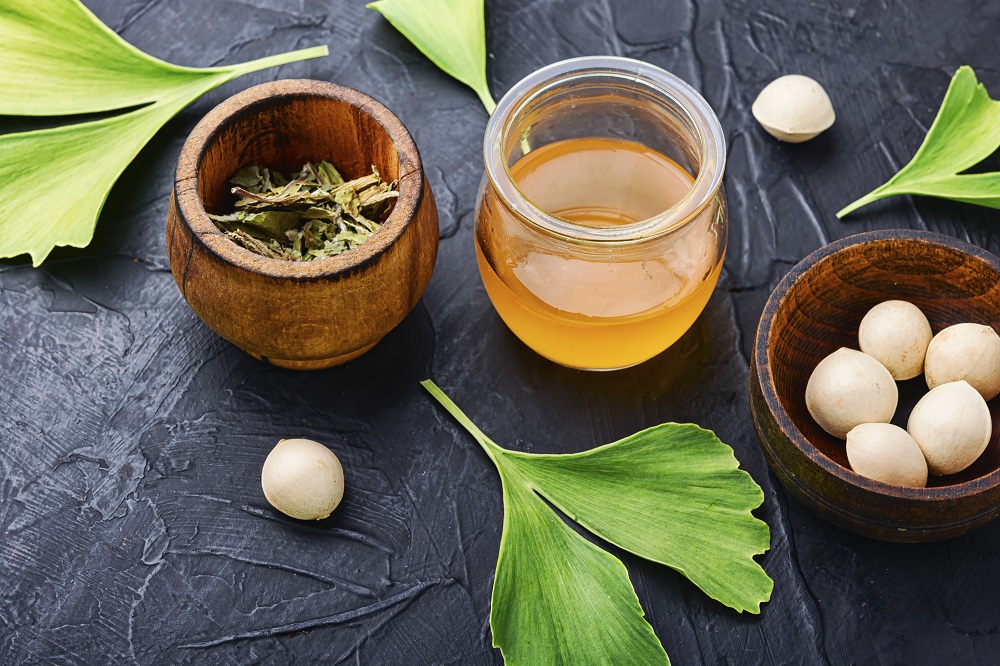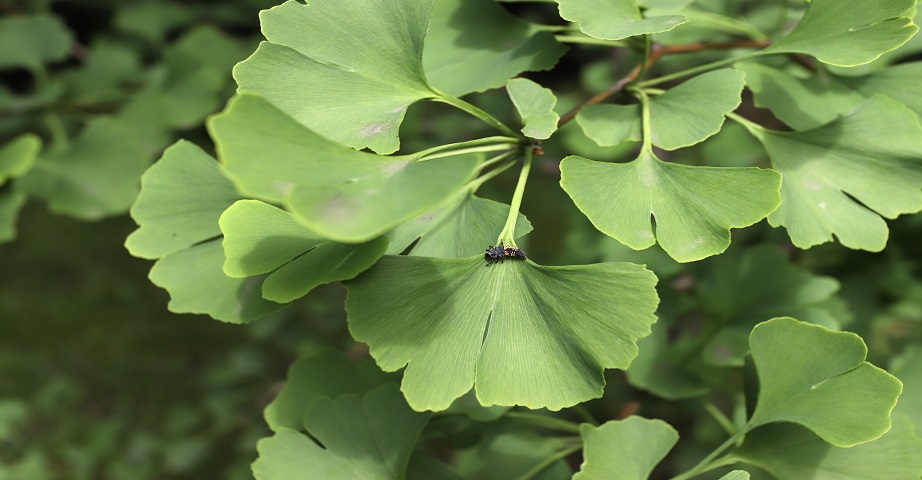Ginkgo biloba - a long-lived tree with pro-health properties

Ginkgo biloba is one of the oldest seed plants, which is often referred to as a living fossil. This tree is considered an ornamental plant, which leaves, due to the wealth of valuable ingredients, are also used in natural medicine. What does maidenhair tree look like? What properties can a plant from the ginkgo family exhibit? Is it worth including in your daily diet supplements with ginkgo biloba?
Summary
What is ginkgo biloba? Basic information about maidenhair tree
Ginkgo biloba, also known as ginkgo or maidenhair tree, is a plant of the ginkgo family, which is considered one of the oldest seed plants in the world. It is a long-lived tree species that can grow up to 4,000 years, and therefore is often referred to as a living fossil. Although the Ginkgo biloba is called Japanese ginkgo, it actually comes from China, and the common name of the plant is due to the fact that the maidenhair tree first came from Japan. Today, the plant is known and grown all over the world, performing an ornamental function, although it is also appreciated for its number of health-promoting properties.
The Ginkgo biloba is associated with rich symbolism, and the tree itself is considered a magical plant. In Asia, the maidenhair tree is planted near temples and monasteries, and the leaves of the plant are used not only as a medicinal raw material, but also as talismans. The Ginkgo biloba is the only representative of the ginkgo family in the world, which is currently considered a relic plant. It is a tall tree, reaching up to 40 meters in height, whose trunk can be 4.5 meters in diameter. The Ginkgo biloba is a diclinous plant, the leaves of which have a characteristic shape, reminiscent of a fan. Ginkgo leaf lamina takes on a vivid green colour, and in the autumn shimmers with a golden-yellow colour. The Japanese ginkgo is a hardy tree that requires virtually no care treatments. For this reason, more and more often the plant can be found both in parks and in urban squares.
Ginkgo biloba - active ingredients
The Ginkgo biloba is a tree with many years of tradition, which is associated primarily with far eastern medicine. Valuable raw material is considered primarily ginkgo leaves, which are a rich source of over 60 different, valuable ingredients. The plant contains, among others:
- flavonol glycosides, such as quercetins or catechins,
- lactone terpenes such as ginkgolides and bilobalides,
- proanthocyanidins,
- carotenoids,
- polysaccharides,
- glucose,
- minerals, among others, selenium,
- vitamins such as vitamin C and E.
Recommended products with Ginkgo biloba
Properties and effects of Ginkgo biloba
The results of scientific research suggest that the Ginkgo biloba may have a multidirectional effect on the functioning of the body. The Ginkgo biloba is used, among others, as a plant supporting memory processes. The analysis carried out so far informs that ginkgo leaf extract may contribute to the stabilization of cognitive functions among people suffering from cognitive disorders and dementia, and may also slow down the process of their deterioration. In addition, the Ginkgo biloba can have a positive effect on blood circulation in the cerebral vessels and may promote the reduction of damaged nerve cells, as well as improve memory, especially cognitive memory. Moreover, due to the wealth of biologically active substances, the plant can exhibit anti-inflammatory properties, which are, positively affecting the inflammation developing in the body - the ginkgo leaf extract may contribute to the reduction of nitric oxide, interferon or prostaglandin E2, and it can also cause increased activation of AMPK protein kinase and heme oxygenase. The plant is also attributed to its antibacterial and antioxidant effects, and according to the results of recent studies, the highest antioxidant activity is shown by procyanidins and flavones contained in the Ginkgo biloba leaves.
The Ginkgo biloba can positively affect the eyesight of people suffering from macular degeneration (AMD), and can also delay or completely inhibit damage to blood vessels in the retina of the eye, leading to visual impairment among people with type II diabetes. Moreover, the plant extract may contribute to reducing the frequency of migraine attacks and may alleviate the symptoms associated with premenstrual syndrome (PMS). The Japanese ginkgo can also have a positive effect on the work of the kidneys, improving their functioning, especially among people struggling with diabetic nephropathy. The plant can affect blood flow, as well as protect the kidneys from the effects of harmful substances.
The Ginkgo biloba, according to the analyses carried out so far, may also have antiatherosclerotic properties, as it contributes to lowering cholesterol and triglycerides. The plant may have anti-diabetic effects because it affects the regulation of glucose and insulin metabolism, and may also reduce the risk of obesity, contributing to the reduction of fat mass associated with the reduction of adipocytes. Although the materials of scientists suggest that the Ginkgo biloba may support the work of the body, further research is still needed to confirm the positive effect of the plant on the human body, because most of the studies conducted so far were based on animal organisms.

Use - in what form to take Ginkgo biloba?
The Ginkgo biloba is most often available in the form of dietary supplements containing the Ginkgo biloba leaf extract. Preparations with the maidenhair tree are available in various forms - in the form of tablets, capsules, as well as powder. Choosing the right product is an individual matter and should be tailored to the needs of the consumer. When looking for a suitable dietary supplement with the Ginkgo biloba, it is worth paying attention to the composition of the product and the presence of active ingredients. The best Ginkgo biloba preparations contain the Ginkgo leaf extract standardized for the content of desired bioactive ingredients, such as gincoflavonoglycosides or terpene lactones, and are free of unnecessary additives and fillers. Deciding to use Ginkgo biloba preparations, it is worth remembering that a few days of supplementation will not contribute to the occurrence of positive effects - to notice the beneficial results associated with the use of the Ginkgo biloba, you should focus on the long-term supply of the preparation, which should last about 2-3 months.
On the market, in addition to dietary supplements containing the plant leaf extract, you can also find other products with the Ginkgo biloba. There are teas, tinctures or infusions using tree leaves. The Ginkgo biloba extract is also a component of cosmetics, because it is recognized that the plant can strengthen the connective tissue of the skin and stimulate the production of collagen, and thus can delay the aging process. Moreover, because the Ginkgo biloba can positively affect blood circulation and can strengthen blood vessels, the plant from the ginkgo family is used for the production of creams intended for the care of vascular skin, because it can reduce the visibility of blood vessels.
Contraindications and side effects of Ginkgo biloba
Although the Ginkgo biloba has health-promoting properties that have been scientifically proven, using the maidenhair tree, special care should be taken, among others due to the fact that the extract from the leaves of the plant may increase the risk of bleeding. Thus, preparations containing the plant should not be used before the planned treatment or operation. In addition, people who take anticoagulants or antiplatelet drugs should consult their doctor before using dietary supplements with the Ginkgo biloba, because the extract from the plant may intensify the effects of some drugs, and also to enter into undesirable interactions with pharmaceuticals.
Side effects resulting from the use of dietary supplements containing the Ginkgo biloba appear extremely rarely. In occasional cases, the Ginkgo biloba may contribute to the occurrence of ailments such as nausea, vomiting, headaches and dizziness or skin rashes.
Bibliography:
- https://www.ncbi.nlm.nih.gov/pmc/articles/PMC10222153/
- https://pubmed.ncbi.nlm.nih.gov/35056751/
- https://www.sciencedirect.com/science/article/pii/S2468550X17302290
- https://pubmed.ncbi.nlm.nih.gov/23440785/
- https://pesquisa.bvsalud.org/portal/resource/pt/wpr-641209
- https://pubmed.ncbi.nlm.nih.gov/32097990/

